
Messiah - My Testimony to Rev. Sun Myung Moon Volume II - Bo Hi Pak
|
|
Messiah - My Testimony to Rev. Sun Myung Moon Volume II - Bo Hi Pak |
Chapter 20 - The Summit Between Sun Myung Moon and Kim Il Sung [Part 3 of 5]
A Hurricane Strikes at Mahn Soo Dae Assembly Halls
On the third day, the prepared schedule called for talks at the Mahn Soo Dae Assembly Halls between Reverend Moon and Committee Chairman Yoon, Deputy Premier Kim, and other North Korean officials.
During the course of the day, we were given a tour of the interiors of the Mahn Soo Dae Halls. The halls were like a palace and were constructed with exquisitely carved native marble. They were magnificent, elaborate, and truly beautiful. I felt both a sense of pride and a sense of marvel that such diversity of marble could he found in my native land.
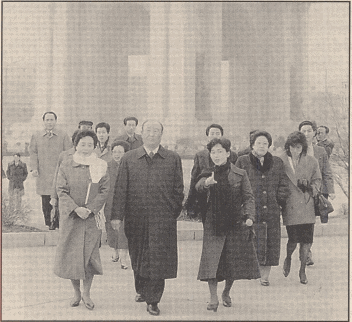
The delegation spent the day sightseeing to Pyongyang.
We held the talks in a large conference room where our two groups faced each other across a large conference table. On the far side of the table sat Committee Chairman Yoon and Deputy Premier Kim, flanked on either side by twenty or more executive officials of the North Korean Worker's Party. On the other side, Reverend and Mrs. Moon sat in the center, and next to them, myself and Hyo Yool Kim. The remaining members of our group sat next to us to the left and right. The plan was to discuss political issues in the morning and economic issues in the afternoon.
Committee Chairman Yoon began to speak first. If you could call our sightseeing tour yesterday a display of the external achievements of the Juche philosophy, then today's schedule was an ideological display, a conceptual exhibition of the Juche philosophy.
Mr. Yoon was truly a good orator. He extolled the profundity of the Juche ideology and the virtues of Leader Kim Il Sung as a great revolutionary. He expounded on why the Juche philosophy, which holds human beings as the central value, is a practical philosophy, why it is the highest of all truths, and how North Korea was moving ahead with success after success under Juche.
Reverend Moon listened to everything carefully. As soon as Mr. Yoon completed his speech, Reverend Moon turned to me and said, "Bo Hi, you testify to them, all right?"
"This is my chance," I thought, opening a binder of notes and documents I had prepared for just such an occasion. Pouring out my heart, I wove the story of Reverend Moon's life, of his ideals and his many achievements across the globe. In one sense, I felt like I was matched up against Mr. Yoon. I put my entire effort into testifying to Reverend Moon and the Unification movement in a way they could understand. At times, I was so consumed with passion that I struck the desk with my fist. This was the first time the North Koreans had heard these things. All seemed more than surprised by what they heard; they looked overwhelmed, and their expressions seemed to say, "We never knew just how extensive the achievements of the Unification movement were!"
When I finished my testimony, they broke out in loud applause. I thought I had done my job well and felt a kind of satisfaction in that. But then it happened. Reverend Moon, who was sitting next to me, stood up all of a sudden. Both our group and the North Koreans were somewhat startled, wondering what was going on; this was the point where the morning session of our discussions was to have finished. So why was Reverend Moon standing up like this?
Reverend Moon spoke. "At this point, I'd better say a few words. Could I have a glass of water, please," he said. He drank the whole glass of water.
Mr. Yoon, visibly startled, said, "Reverend Moon, wouldn't you prefer to speak sitting down?" to which he replied, "No. What I have to say is important, so I'd better stand while I say it." And then he began to speak.
Seeing the intensity with which Reverend Moon started, long years of experience told me intuitively what he was going to say. The reason he got up from his seat indicated the content; he got up so that he could move his body about freely while speaking. I tensed up. I had no idea how things were going to unfold. Reverend Moon began to summarize the Unification Principle.
First of all he asked the North Koreans if they knew what the purpose of God's Creation was and proceeded to explain human history, starting with the first human ancestors, Adam and Eve. His speech comprised all the core elements of the Unification Principle: the ideal of God's creation, the Fall of Adam and Eve, the history of God's efforts for human salvation, the mission of Jesus Christ, and the ideology of returning resurrection and the ideology of True Parents.
As he continued his explanation, Reverend Moon's fervor steadily increased. He had apparently forgotten that we were in North Korea, in the Mahn Soo Dae Assembly Halls. The only thing he was focused on was pouring out, directly and clearly, the words that God was giving him.
The date was December 2, which was a Sunday. Thus, on the day that Christians usually attend their weekly service or mass, Reverend Moon was giving a historical sermon to the core ranks of the Democratic People's Republic of Korea. For Mr. Yoon, as well as for all the officials from the government and the North Korean Worker's Party who were present, it was the first time in their lives to hear a sermon, to listen to the word of God.
For the moment, everything was all right. Presently, however, with perspiration pouring out, Reverend Moon was roaring away as if he were speaking before a huge audience at a rally. He treated the North Korean officials gathered there not like hosts, but like members of the Unification Church.
Reverend Moon spoke while jabbing his finger, pointing it at Chairman Yoon. "What's all this about 'the Juche ideology'? You're telling me the Juche ideology is an ideology centered on humans? How the heck can human beings he the center of the universe? Don't you know that human beings are just another kind of created being? Human beings are not the Creator! They aren't! Have you got that, Chairman Yoon? They're created beings, created, I tell you! So, above human beings, you have God. God exists on a higher level than human beings! But you don't even know that, and you talk all this rubbish about the wonderful Juche ideology. And you're saying that we can achieve unification through the Juche ideology? Not a chance! Not a chance in a million! I'm telling you that you have to attend God, you have to pay more attention to God than you do to Juche ideology. The only way for North Korea to survive is for you to connect with God and bring Him here! Hey! Chairman Yoon! Do you get it? I'm asking you if you get it! Why don't you answer?"
I felt like my heart would stop. My whole body became tense and my lips were dry. I worried that our hosts would just stand up and walk out of the room or even lose it completely and jump at Reverend Moon. I was trembling, not because I was scared but because I was worried that some-one might hurt Reverend Moon.
He went on, "There is no way you can bring national unification with the Juche ideology! Unification is something that God will achieve. That's why you can't achieve Korean unification without going through Godism and headwing thought! No way! National unification is going to be brought about by me! I'm the one who'll do it! You should entrust the problem of national unification to me, you hear! I will rescue North Korea. Have you got it, Chairman Yoon?"
Reverend Moon kept pounding on the table. Chairman Yoon did not answer at all but just hung his head. All the North Korean Worker's Party officials sitting beside and behind him just glared. Their bodies were trembling, and they looked as if they were about to jump in attack or something.
I passed a small piece of paper to Mr. Hyo Yool Kim, who was sitting beside me. "All finished. We are dead," I wrote. Protecting Reverend Moon in case one of the Northerners attacked him was my only concern.
"Look here, Chairman Yoon. Deputy Premier Kim! You should entrust North Korea to me. Let me take care of it for three years. A good living standard will be available to everyone. I don't mean I want to be president. What I'm saying is that I'll open the way for everyone to live well under President Kim Il Sung."
Again, we all held our breath in suspense. If Reverend Moon continued to make Kim Il Sung the subject of his discussion, something was bound to happen.
"Don't get me wrong; I like President Kim. But even that fellow has to listen to what I have to say. My words! Get it, Mr. Chairman?"
Again Reverend Moon poked his finger at Mr. Yoon. "Why don't you answer me, huh?" He was treating Chairman Yoon like an elementary school student. And the one receiving this treatment was one of the highest officials in the North Korean Worker's Party. At that point, all I could see before me was darkness and gloom.
Finally, everything was over. Now, there was only one problem left: getting Reverend Moon out of Pyongyang alive. The Northerners took the whole thing as a tremendous affront. I guess they felt that their good faith had been betrayed. But what was even more fearful was that they would declare it as a criticism of the Juche ideology, which for them was sacred and inviolable. They would say that Reverend Moon had insulted the "Great Leader." For them, it wouldn't matter who did these things, or which nation that person came from. It was a very serious matter, and the person who did this would deserve nothing less than capital punishment. They would have recorded all the words that Reverend Moon spoke today, and these would now be heard by both Kim Il Sung and Kim Jong Il. They would he extremely angry and respond in a drastic way. I thought we could kiss goodbye any meeting with President Kim.
Reverend Moon had spoken like this for about an hour and one half, and by now it was well past noon. No one clapped.
I quickly ushered Reverend and Mrs. Moon out of the meeting room so that we could return to our accommodations. Reverend and Mrs. Moon got into the lead car, and Hyo Yool Kim and I got into the following one. One vice chairman under Chairman Yoon got into the front passenger seat of each vehicle. As soon as our car started off, the committee member let his anger explode.
"How on earth can you behave like that when you come here as guests? We can't forgive that sort of thing. In this country, that's enough to get you the death penalty. If the citizens of Pyongyang heard what was said, they'd come here with big sticks and beat the daylights out of you all." He was so indignant that drops of spit came from his mouth as he berated us.
I desperately tried to placate him. "Please calm down, Mr. Vice Chairman. Reverend Moon only said the things he did out of love for this nation, for this people. There are lots of different ways of expressing love, don't you think? Why would Reverend Moon go so far as to say those things? He was simply being straightforward, wasn't he?"
He replied, "It was a mistake to let such a person even set foot in the Republic. If the Great Leader found out about this, there'd be real trouble. It was a complete blasphemy against the Great Leader! It seems like you don't know how afraid you really should be. We'd better teach you a lesson!"
His words were a bald-faced threat. I felt the blood drain from my face.
At the luncheon table, it was just our small group from the Unification movement.
"I just said what I had to say, didn't I?" Reverend Moon said. "Do you think I went a little bit too far?" He flashed a big smile.
"Father," I quietly answered. "I think you had better forget about meeting Kim Il Sung."
To this, Reverend Moon's words fell like a lightening bolt. "Did I come here just to meet Kim Il Sung? I tell you, I came here to speak the truth. God wants me to say everything I have to say at least once before I have to leave. It's also a test of Kim Il Sung. How much of a man is he? Just wait and see if he is petty-minded or brave and broadminded. If he won't see me just because I said a few strong things, then that's rather petty-minded, isn't it?"
To me, a meeting with Kim Il Sung seemed out of the question. After the shock of being on the receiving end of those words, there was no way that Chairman Yoon or Deputy Premier Kim would let Reverend Moon meet President Kim. To them, Kim Il Sung was like God, and they served him as such. Of course, if such an outburst took place in front of Kim Il Sung, it would he their heads that rolled, literally.
After lunch, I turned to Mr. Hyo Yool Kim. "How old do you feel after that? I reckon that meeting took at least ten years off my life," I said. "Anyway, we'd better make plans about how we are going to get out of here,"
A Climb up Kumgang Mountain
In the midst of such uneasiness, I awoke on our fourth day in Pyongyang. The date was December 3.
According to our schedule, we would be going to Kumgang Mountain and doing some sightseeing of the natural beauty there. (Kumgang Mountain is located near the border with South Korea. It is the most famous of the mountains in the Tae Back mountain range and rises 1,638 meters above sea level.) We were to spend one night there and then return to Pyongyang, but was that the way things would actually turn out?
About the time we were finishing our breakfast, some government officials came to guide us. Their expressions were somewhat stony-faced, but there didn't seem to be anything wrong or unusual.
We went out to Sunan Airport and got aboard a specially scheduled flight. Deputy Premier Kim greeted us brightly. During the approximately one and a half hour flight, Reverend Moon and Deputy Premier Kim were involved in a deep discussion. Reverend Moon spoke while referring to notes he had written in his notebook during the night. After having prepared what he wanted to say, he was now going through the contents according to plan. It was perfectly clear to the rest of us that he was talking about God.
No matter what the situation or circumstance, Reverend Moon walks the way of the evangelist to the fullest. Even if it is just one person more, even if it is one or two words more, he always wants to give as much as he can. He talked warmly with Deputy Premier Kim as if it was the first time they had met. I wonder if there is anyone else like him; in his innocence, he might seem artless and guileless as a person could be, and yet, at the same time, he is as dauntless and daring as a tiger in its element. To me, he is a constant source of amazement.
At Kumgangsan (san) means mountain in Korean), they took us to the most impressive and elite of the presidential accommodations, where we changed into more comfortable clothes. We then started up the mountain.
In winter, Kumgangsan is also known as Kae Gol San, because there are no leaves on the trees, and only the craggy rocks and tree branches are visible. But Kumgangsan is beautiful in any season, and in each season, it has its own special character.
Kumgangsan covered in the snows of December is a scene that defies description. It is just like the words of the song: "The twelve thousand peaks of Kumgangsan! Every peak is a wondrous rock." It is really one of God's masterpieces. We climbed Man Mul Sang first of all. Until then, it was a place I had only dreamed of, and I couldn't quite believe that I was actually standing there. The name Man Mul Sang is most appropriate; the cliff face is formed of unusually shaped rock formations and looks just like an oriental folding screen. Each section of the scene is a masterpiece in itself.
It was also the first time for Reverend Moon to climb the famous Kumgangsan. Up until that time, sometimes he had been asked, "How is it that you were born in Jeong Ju in North Korea and you haven't ever been to Kumgangsan?"
At those times, he would say, "How can you go sightseeing when your nation has been stolen from you?" and reminisce about how he thought that he would go to see Kumgangsan after the nation had been restored to independence. In those days, just about all of Reverend Moon's thoughts were somehow connected with the independence of our nation. (Translator's note: When Sun Myung Moon was born in 1920, Korea was occupied by the Japanese. National independence was only restored in 1945 after World War II.)
"This national treasure, this jewel of our homeland! I will see to it that you belong to a unified homeland!" This is what Reverend Moon must have been thinking as we climbed those peaks.
The next day we went off for Kuryong Pokpo (the waterfall of Nine Dragons). Although it was winter, water still thundered down the Kuryong Lake falls. Just above the falls are the eight ponds known collectively as Pal Dahm, where legend has it that fairy nymphs used to descend from heaven to bathe.
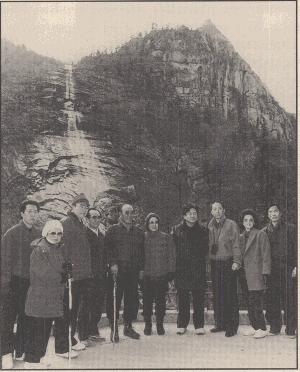
The delegation visited Kuingang Mountain, located near the border with South Korea.
According to one story, a woodcutter was smitten with one of the fairy nymphs and hid her winged clothes while she was bathing. The fairy woman had no choice but to remain on earth, where she lived with the woodcutter and eventually bore him a child. The woodcutter thought it was safe by then and returned the winged clothes to the fairy woman, but although her heart was tied to earth, she returned to heaven, even while shedding tears. The meaning of the story is that heaven and earth cannot be mixed. Thus, Kumgangsan is not only a place of incredible scenery but also the home of numerous legends and folktales.
They say that underneath the place where the water pours down the Kuryong waterfall is a pool thirteen meters deep, hollowed out so that it is like a stone mortar. How long must it have taken for such a hole to be hollowed out by the falling water? Just thinking of it makes me feel the perpetuity of nature and the greatness of nature's power. It was almost like I could feel the heart of the person who made the famous song:
Kumgang-e sa-reu-ri-ratta. Kumgang-e sa-reu-ri-ratta.
Unmu derigo Kumgang-e sa-reu-ri-ratta.
P'ungjin-e sseokkeun myeongni-ya aneunch'e-na ha-o-ri.
I want to live in Kumgang I want to live in Kumgang
I want to live in Kumgang with the clouds and the mist.
What need have I to think about the fame and wealth of worldly life?
For the last fifty years, the Kumgangsan has been privileged to be part of the thorny history of our people, as well as all our joys and sorrows. This mountain truly belongs to all our people. When reunification is finally achieved and our people reconciled, then I'm sure the water will fall all the stronger from the beautiful Kuryong Falls.
While we were sitting at the small Buddhist temple there, resting for a bit, I leaned over and whispered softly to my wife, "Darling, now that you have seen the Kumgang Mountain, have I made up for that honeymoon we never had?"
My wife replied, "All right. That's OK. But why on earth are you thinking about that now? You should be paying more attention to these wonderful sights, don't you think?"
"Well, you have to pay off a debt when you have the money, don't you?" I said. "So, I think I'd better take the opportunity while we are at Kumgangsan to pay off that one. Right now, I'm the richest man in the world." I laughed.
If it weren't for this opportunity, when would the two of us have had the chance to visit Kumgang Mountain? It was a blessing from God and True Parents.
The day before, on our way here, our plane had landed at Wonsan Airport, and from there we drove south by car for about two hours to finally arrive at Kumgangsan. On the way, we had stopped and taken a look around the scenery at Sam Il Po (Three Day Falls). They say that this place was given the name Sam Il Po in ancient times after a king had stopped to look at the falls and been so enchanted that he stayed there for three whole days. In the North, they say that it is one of the three great sights of Asia. It is not hard to believe, either. No one in our party wanted to leave the place.
I wonder who coined the phrase, "Sam Ch'eon Ri Keum Soo Kang San" ("Three thousand ri of rivets and mountains, birds and beasts -- land of beauty," a phrase used to describe the land of Korea)? A land truly blessed by God, our three thousand ri country with beautiful mountains and streams! But we are cut across the middle, and our people cannot move freely even between North and South! Once again, I felt most acutely how sorrowful was the division of our nation.
A Visit to Reverend Moon's Hometown
We returned to Pyongyang on December 4. The next day was the sixth day of our North Korean visit, and still there was no word about a meeting with President Kim Il Sung. My mind felt heavy and oppressed. If we returned home without even having had talks with President Kim, we would probably be a laughing stock.
In the midst of these apprehensions, we started out to visit Reverend Moon's hometown. Two helicopters were provided for us. They were really treating us like high-ranking state visitors. In both preparation and in protocol, they didn't neglect a thing.
The weather was clear and the ground was white with a fine layer of snow. We looked down and saw the neatly organized North Korean farmlands with little hamlets here and there, as well as the occasional schoolyard. The scenery was quite beautiful, although the absence of trees on the mountains and in the parks was conspicuous.
The helicopters landed in Jeong Ju after about thirty minutes, in the schoolyard of an elementary school. Reverend Moon's family and the officials from the Korean Worker's Party in that area came out to welcome him. A motorcade took us to Songsa-ri near Deokeon-myeon, in Jeong Ju-Gun, Pyeong An Puk Do -- Reverend Moon's old home. The narrow farm roads made it hard driving, and in some places you could see where major repairs had been made. It was abundantly obvious just how much effort the North Korean authorities had made for Reverend Moon's visit to his hometown.
Presently the house where Reverend Moon was born appeared. It was a large, tile-roofed house. Originally, it had been even larger, comprised of four buildings in a rectangular shape: the sarang-ch'ae, where the master of the house lives; the an-ch'ae (inner quarters); the storehouse; and the livestock shed. Together they would have formed a square like the Chinese character for mouth. Now, all that was left was the an-ch'ae, the inner quarters where the women customarily live. That was the most important part of the house, however. That was where Reverend Moon had been born.
Just the fact that Reverend Moon's birthplace was still standing was a miracle in itself. That a house almost one hundred years old had been neither destroyed in the Korean War nor razed under the communist regime, but remained there in perfect condition was so mystifying that I wondered if this weren't a replica. This was the house where one of the top anti-communist leaders in the world was born. All of us found it hard to imagine. But here was Reverend Moon, returning to his beloved birthplace, seventy-one years after his birth and for the first time in forty-eight years. And being guided there by the government of North Korea!
Our entire group entered the an-hang, the inner rooms. Reverend Moon looked deeply moved. He touched the floor with his fingers and went to sit at the place where the chimney flues entered under the ondol flooring. Mrs. Moon, too, was full of emotion as she held Reverend Moon's hand. Our group went into the small room to sit together with them.
"OK. Let's pray," said Reverend Moon.
He began to pray, and Mrs. Moon dabbed at her eyes with a handkerchief. This was not an ordinary prayer, but a prayer of determination that he would devote the rest of his life to accomplishing both national reunification and true world peace. He also offered thanks, from the bottom of his heart, for his miraculous survival through so much suffering, for so many incredible victories, from the time that God gave him birth in this house, to when Jesus Christ was sent to invest in him his great mission, up until the present. It was a prayer of gratitude and determination that welled up from a realization that, if not for divine protection, he would never have been able to achieve such a day as this. The prayer enveloped us in a sense of solemnity and drew tears from each one.
After finishing the prayer, Reverend Moon moved from room to room reminiscing. "This room seemed to be much bigger back then," he said. We could see he was deeply stirred.
At the side was a small opening where food was passed in from the kitchen, and in the wall on the left was a small door that could be used to go in and out from the area behind the house.
"I always used to slip out the back through that door," said Reverend Moon. He opened the door and looked out into the backyard. He exclaimed that the backyard had been thick with trees then, but now there was nothing.
In the main building, the kitchen was located on the left side; next to it were three rooms. The room directly adjacent to the kitchen was the an-bang, and it was here that Reverend Moon had been born on January 6, 1920 (according to the lunar calendar). It was from here that an incredible history for humanity's salvation was begun by God. Thanks to the birth of this one man, I, myself, found God, and thanks to the birth of this man, humanity has found hope. This little room was the place where the vision for heaven on earth was born, the goal that is God's long-awaited desire. From here, that vision spread out, at first through the Korean peninsula, then through Japan and America out to the entire world.
The house had been spruced up. The authorities must have been in quite a hurry; the paint on the frame of the lattice windows was still wet. It rubbed off on my overcoat in big splotches. However, I was grateful for the efforts made by the North Korean government. I'm sure they never imagined that the day would come when they would bring here, as their guest, Rev. Sun Myung Moon, the same man they had labeled "the VOC ringleader" and "the chief agitator of the anti-revolutionary forces." Yet, despite the fact that they knew whose house it was, it was still here, undisturbed. And when they heard that he was coming, they fixed up the place in such a hurry that the paint was still wet. What a wonderful gesture!
Our group took some commemorative photographs, then moved on to the place where Reverend Moon's parents were buried. The grave was close by. On the way, Reverend Moon pointed out the mountains and streams of his hometown, each filled with old yearnings and distant recollections. The edge of each rice paddy, each path between the vegetable fields, held so many memories of his childhood days. The landscape around us seemed to echo in joy, calling out to its precious visitor, "It's been so long since we've seen you here."
"Ah, yes, this one used to be our family's rice field. I used to plant the seedlings here. I used to harvest the grains, too..."
Harvest time had already passed. Unable to simply pass by, Reverend Moon walked into the field and had a photo taken together with Mrs. Moon.
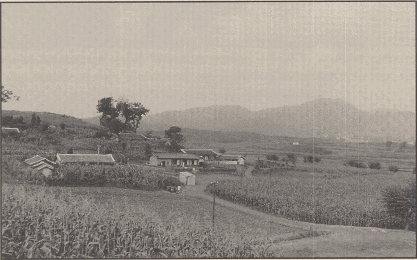
The birthplace of Reverend Moon.
At the grave of Reverend Moon's parents, we found a gravestone standing in position, and a stone offering table in front of the grave mound. "Grave of Kyeung Yoo Moon and Kyeung Kye Kim (Moon)" was marked on the front of the gravestone in Korean letters, and on the back, engraved in red letters was "Grave Owners: Ryong Soo Moon, Ryong Myung Moon." Kyeung Yoo Moon is the name of Reverend Moon's father, and Kyeung Kye Kim is his mother's name. Ryong Soo Moon is Reverend Moon's elder brother, to whom he was exceptionally close.
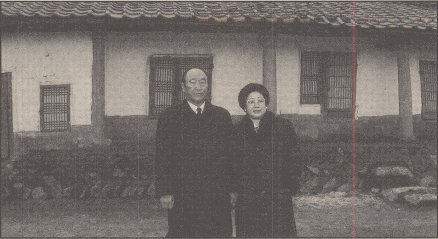
Standing in front of its birthplace, Reverend Moon reminisced about his visit and prayed to gratitude for the miracle that the house was still standing after almost 100 years.
Ryong Myung (Yong Myung) was Reverend Moon's childhood name. It is said that before Kyeung Kye Kim Moon became pregnant with Reverend Moon, she had a prophetic dream in which a large white dragon rose up to the heavens with a large white pearl in its mouth. I'm not sure if that is the reason, but the name she gave Reverend Moon straight after his birth was Yong Myung Moon, which uses the Chinese character for dragon, Yong (ryong).
Reverend Moon laid a bouquet of flowers on the stone table, after which his wife did the same. After a few moments of silent prayer, Reverend Moon went over to the grave mound and, speaking softly, gently stroked the turf that covered it.
"Mother, I have come. Now that you are in the spiritual world, Mother, you understand everything, don't you? You understand what I am doing, right?"
His loving mother was the one who went crying to visit him in the Hungnam concentration camp. She had thought him a heartless and cruel son, and reproved him for not understanding her heart and devotion. Reverend Moon spoke to her now as if the two of them were standing face to face. I felt as though I could almost hear his mother's voice answering quietly, "My son, I'm ashamed that I was so ignorant of Heaven's ways. I thought of everything with only my human views. I even resented you. But after I arrived in the spiritual world, I came to understand how brave and glorious you are. How much you have suffered in your determination to save humankind and achieve God's Will. Please forgive your mother, who failed to understand those things then." Her voice seemed to linger in my ear.
Reverend Moon's younger sister, Hyo Seon, unable to hold hack tears any longer, burst into sobs. She wept, slapping the ground in the traditional Korean expression of great sorrow.
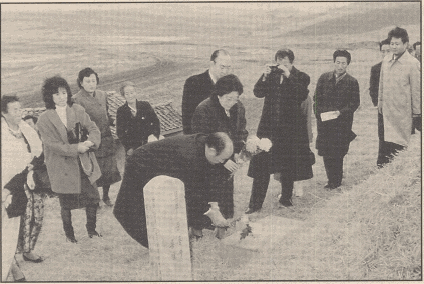
Reverent and Mrs. Moon place flowers on the graves of his parents.
"Dear Mother, my Mother. Yong Myung has come here, Yong Myung whom you longed and longed to see just once before you passed away. He is here now. Why don't you speak, Mother? Please come to us and meet with Oppa (elder brother). Didn't you always say how much you wanted to see him? Mother, my mother. Why don't you say something? Why..." The sound of her weeping reverberated clearly through the air.
Reverend Moon gently touched his younger sister. "Mother is in heaven and she understands. She knows all about it," he said. "I understand your heart, I really do. But now is not the time. Here, come dry your tears."
Even now, knowing the ways of Heaven as he did, Reverend Moon did not show a single tear. He understood very well what position and situation his physical parents were now enjoying in the spiritual world. Moreover, even now Reverend Moon lived each day in complete awareness of his heavenly mission. Having come here with a mission entrusted to him by God, he could not allow himself to be tied up with feelings related only to his personal family affairs. But there was no doubt that, inside him, emotions were stirring deeply and profoundly.
Reverend Moon looked about him in all four directions at places so tied to feelings and experiences from the past. Pointing at this mountain here, at that mountain there, he explained each one of them to us. One of the mountains was the one where he prayed when he was fifteen years old and Jesus appeared to him. He explained that the name of the mountain was Myo Doo San (cat's head mountain). This was it, then, the mountain of the royal summons, the mountain where God and Heaven asked him to take on the mission.
Again, Reverend Moon pointed to a river and told us that, as a boy, he would spend the whole day fishing there. On the other hand, Reverend Moon also pointed out that the lay of the land can change, even in ten years' time. He said he could not find any of the features of the village and the vicinity surrounding where he used to live as a boy.
After we finished offering our respects at the grave, we returned to the cars and drove to the house of Byeong Hyeong Moon, the eldest son of Yong Soo, Reverend Moon's elder brother. There, forty-two members of the Moon clan were waiting; they had been invited by the North Korean government. Waiting for all the visitors was a large lunch, which Byeong Hyeong Moon had spared no effort in preparing.
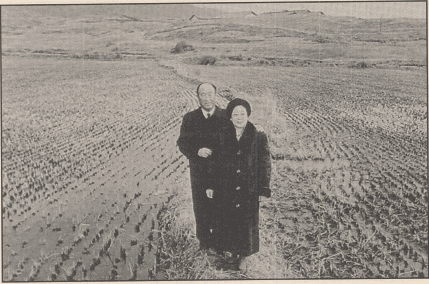
The Moon family's rice field. Reverend Moon recalled. "l used to plant the seedlings here. I used to harvest the grains too."
The first thing Reverend Moon did was to shake hands with each of his relatives and introduce his wife, Hak Ja Han. Almost all of them were unknown to Reverend Moon. They, on the other hand, were quite beside themselves that a member of the Moon clan had become such a great international figure. They took some commemorative photographs all together, and the names of each one were recorded on video.
There was lots of food to eat on the luncheon table. All of the dishes were foods that Reverend Moon used to eat long ago when he was a boy. There were many different kinds of rice cakes and lots of fruit. Reverend Moon, however, devoted himself to enjoying several pieces of steamed corn on the cob, saying, "This is what I used to eat all the time."
Important local figures from the Worker's Party were also there, eating together at the table. So there he was, one of the most prominent anti-communist leaders in the world sitting together with local officials of the Communist Party, all of them enjoying a cheerful lunch.
I thought to myself, "If this can happen, is there any place on earth that cannot be reconciled? Surely, nothing can stop the coming of peace!"
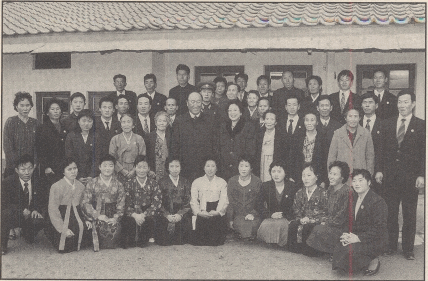
A commemorative photograph of the Moon family in front of his boyhood home.
These communist officials were so happy that such a world leader had been born in their hometown. They praised Reverend Moon in words that, while simple and naive, were quite sincere. They also asked me for photographs of Reverend Moon. I took out a photograph of Reverend Moon and Mrs. Moon that I kept in my wallet and presented it to them.
The fact that Reverend Moon was the "despicable anti-communist leader" so talked about in North Korea was as known to the Moon clan as any other North Koreans. But we could see from our meeting that day that there had been no persecution or punishment of the Moon clan on account of Reverend Moon's work. This is one reason that Reverend Moon took another look at who Kim Il Sung is.
In the schoolyard, where the helicopters were waiting, small children from the school were preparing to perform. They were so cute, and their singing and dancing were really first class. Reverend and Mrs. Moon shook hands with each one, touching and stroking their heads.
In this way, Reverend Moon's historic visit to his hometown on December 5, 1991, carne to a close. Our group boarded the helicopters and headed in the direction of Suwan Airport. Although we didn't know it at the time, big news was waiting for us.